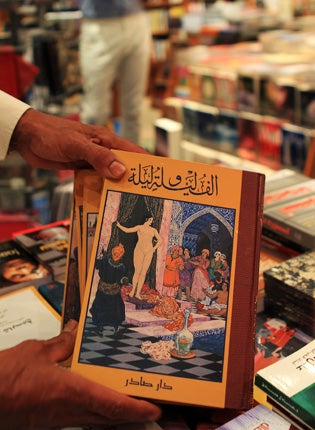Egyptian Islamists attempt to draw a veil over 'salacious' masterpiece
Robert Fisk reports on the hardline law group that wants to censor passages from 'One Thousand and One Nights'

Your support helps us to tell the story
From reproductive rights to climate change to Big Tech, The Independent is on the ground when the story is developing. Whether it's investigating the financials of Elon Musk's pro-Trump PAC or producing our latest documentary, 'The A Word', which shines a light on the American women fighting for reproductive rights, we know how important it is to parse out the facts from the messaging.
At such a critical moment in US history, we need reporters on the ground. Your donation allows us to keep sending journalists to speak to both sides of the story.
The Independent is trusted by Americans across the entire political spectrum. And unlike many other quality news outlets, we choose not to lock Americans out of our reporting and analysis with paywalls. We believe quality journalism should be available to everyone, paid for by those who can afford it.
Your support makes all the difference.How come the Muslim world – at its moments of greatest crisis – will invariably manage to deflect its energies into the most preposterous cultural, historical or religious questions?
Egyptian Islamists have said they want to censor "salacious" passages from the One Thousand and One Nights, one of the Muslim world's priceless literary works. This is the same country whose prelates once ordered a university professor to divorce his wife because he had dared to suggest a reinterpretation of the Koran.
Ayman Abdel Hakeem, a member of the "Islamist Lawyers without Shackles" group, wants to censor the tales told in the Arabian Nights because the epic "contains profanities which cannot be acceptable in Egyptian society." The very idea of an insatiable woman offends him. "We understand that this kind of literature is acceptable in the West, but here we have a different culture" he is reported as saying.
True, this odd lawyers' group has been making similar statements for more than a decade, but the idea that the Muslim world should not be able to read about Sinbad the Sailor or Aladdin is obviously ridiculous.
Saudi Arabia, too, is just now bound up in a "fatwa" war by ulemas who are variously giving or condemning new religious rulings. Sheikh Adel al-Kalbani, for example, claims that the Koran does not specifically forbid music – even though the Saudi authorities do not allow concerts. Sheikh Abdul Mohsen al-Obeikan ruled that a woman cannot walk alongside a man – although he is the same divine figure who also suggests that two of the five daily prayers might be combined, thus making life easier for Saudi merchants constrained to close their shops five times a day. Who would believe that this is the same Saudi Arabia which is trying to fight off al-Qa'ida bombers, and fears that Iran will acquire nuclear weapons?
In Egypt, Mohamed Salmawy, president of the Egyptian Writers' Union, says, surely correctly, that the Islamists want to take their revenge on intellectuals who have been fighting for free debate in Cairo. "The Taliban ruined the Buddha statues in Afghanistan and these people here are trying to destroy an equally important monument of our heritage," he told the Los Angeles Times.
Is that all it is? Or, as some Arabs suspect, are all these debates started by lesser known writers and clerics merely to gain personal publicity?
"You have Salman Rushdie and Martin Amis offending Muslims," a Lebanese intellectual and writer commented. "Did they want to offend Muslims? I don't know. But they got tremendous publicity in the West from what they said. Now we have the same thing here. Every time these people speak, they are interviewed on our televisions – at a time when the Arab world is facing unprecedented challenges over the failure of the Americans to help the Palestinians."
Lebanon is an odd place to hear these words. Adolf Hitler's Mein Kampf can still be bought in Beirut – originally printed in Damascus on a press run by Syria's former defence minister, Mustafa Tlass. Should Mein Kampf be censored or banned in Lebanon, as the US has suggested, even though it has been published in Europe?
More seriously, why were Lebanese World Cup supporters allowed to fly not just German but swastika flags – allegedly to support Germany's team – alongside pictures of Hitler?
In Beirut, some swastikas and Hitler pictures are flying in an Armenian district where the local population are descendants of victims of the 1915 Turkish genocide – which Hitler admitted was his inspiration. Egypt, it should be remembered, also recently broadcast a version of the Protocols of the Elders of Zion, the old tsarist forgery which was responsible for so much anti-Semitism in Europe.
At a time when many suspect there will be a new war between the Lebanese Hizbollah and Israel next year, it seems almost incomprehensible that a people will fritter away their energies on this nonsense.
Subscribe to Independent Premium to bookmark this article
Want to bookmark your favourite articles and stories to read or reference later? Start your Independent Premium subscription today.
Join our commenting forum
Join thought-provoking conversations, follow other Independent readers and see their replies
Comments